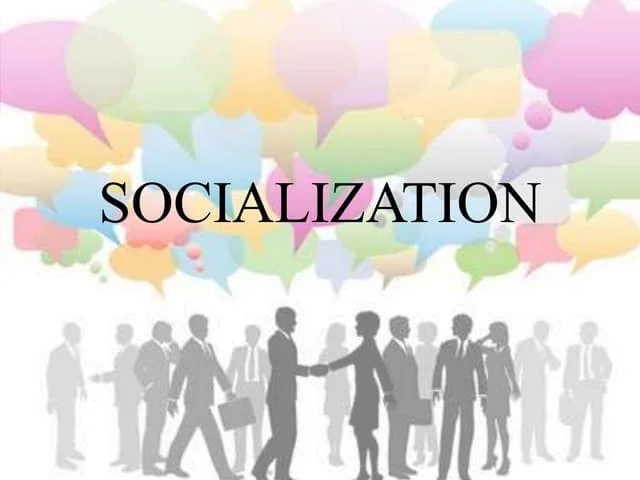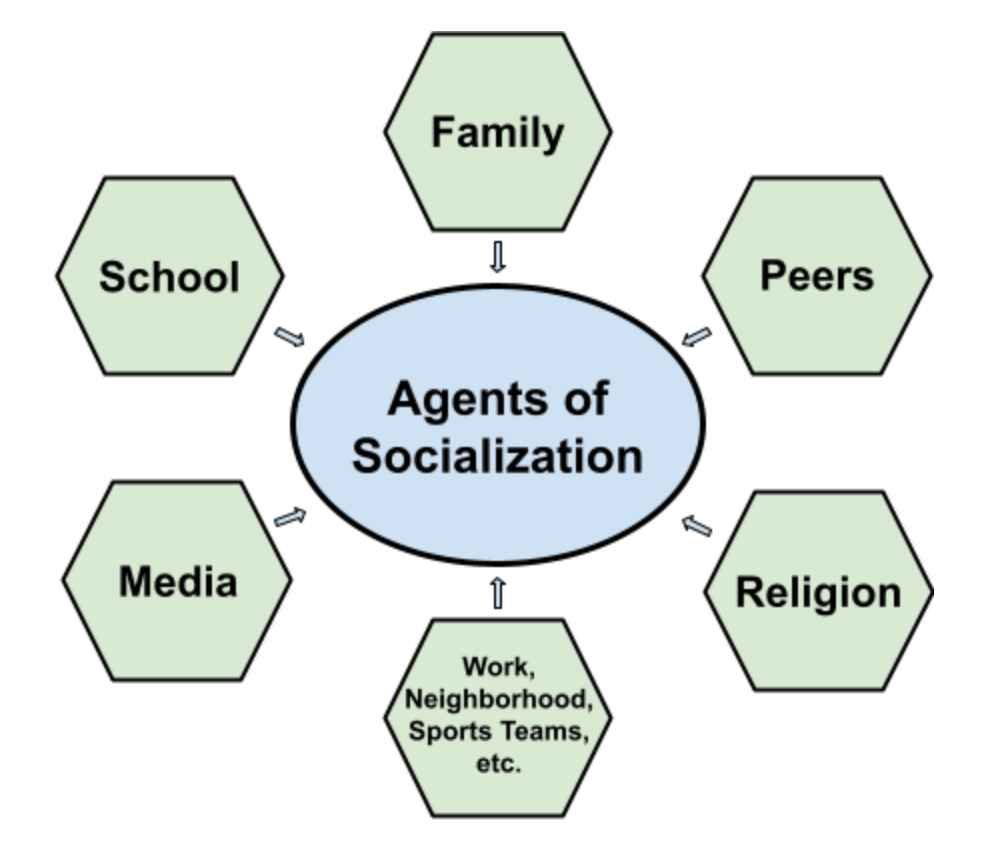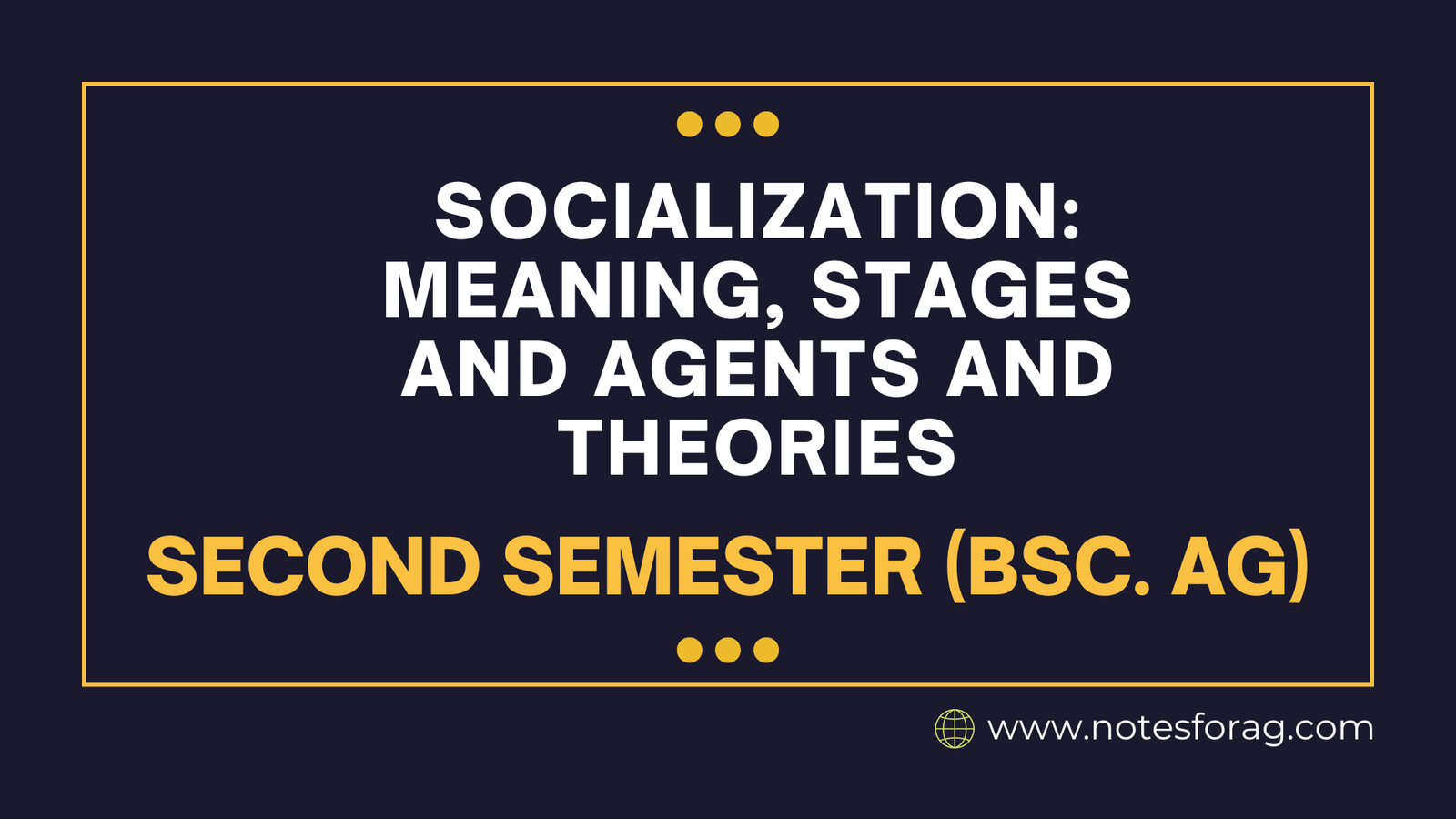The process of learning and internalizing the values, customs, and behaviors required for a person to function in their society is known as socialization, and it occurs throughout a person’s lifetime. Primary socialization takes place in early childhood and is facilitated by the family. Secondary socialization involves peers, schools, and the media. Eventually, adults adapt to new roles and experiences. The media, religion, the workplace, schools, peers, and families are important socialization factors. A variety of viewpoints on how it shapes personal identities and the stability of society are provided by socialization theories, including developmental theories, symbolic interactionism, conflict theory, structural functionalism, and social learning theory.
Table of Contents
Meaning

An essential process for both the growth of the individual and the operation of society is socialization. It can be described as the continuous process by which people pick up and assimilate the morals, principles, social skills, and conventions necessary for productive engagement in society. An individual’s behavior, identity, and social roles are profoundly shaped by this process, which starts at birth and lasts the entirety of their life.
Fundamentally, it is essential to the continuity and stability of society. People are enmeshed in a web of social interactions from an early age, which teaches them the acceptable ways of feeling, thinking, and acting. People acquire the cultural norms and social expectations that direct their behavior in diverse contexts from a variety of sources, including family, school, peers, the media, and other agents. Through this process of learning, people can participate in their communities with competence, upholding social norms and performing their assigned roles.
It is crucial for more than just personal growth. Because it guarantees that people comprehend and uphold the norms and values of the community, it is essential to the preservation of social order. For social systems to function smoothly and for communities and institutions to function properly, predictability and stability are fostered in part by conformity. Furthermore, it provides people with the skills they need to make positive contributions to the group’s well-being and develop into useful members of society.
Stages of Socialization
It is a continuous process that gives people the abilities, information, and behaviors needed to contribute to their society. Primary socialization, secondary socialization, and adult socialization are the three main stages of this process that are commonly recognized, and they are each distinguished by unique experiences and benchmarks.
1. Primary Socialization:
In the early years of life, family and close caregivers play a major role in facilitating primary socialization. Children pick up essential language, cultural customs, norms, and values during this time. A child may, for instance, pick up early social skills from interactions with parents and siblings or learn basic manners like saying “please” and “thank you.” Establishing a foundation that will impact later stages of socialization, the family environment provides the primary context for emotional support and early identity formation.
2. Secondary Socialization:
Later in childhood and through adolescence, it takes place. The impact of larger social institutions, like the media, peer groups, and schools, characterizes this stage. Children and teenagers hone their social skills and expand their comprehension of social norms and expectations during this process. Formal education is one of the most important experiences for students since it teaches them academic material and social norms like cooperation and punctuality. Peer relationships are especially important because they offer a setting for practicing social norms, navigating identity, and encountering acceptance or rejection from others. People’s worldviews are further shaped by media exposure, which exposes them to a variety of viewpoints and cultural norms.
3. Adult Socialization:
It is the lifelong process of learning and adjustment that takes place in an individual. People experience new roles and settings as they grow into adults, necessitating ongoing social learning. Getting a job, developing close relationships, and having children are a few examples of it. Every one of these experiences entails adjusting to new social roles and expectations, like learning how to communicate in romantic relationships, comprehending workplace norms, or becoming an effective parent. As people work to stay relevant in a rapidly changing society and adjust to shifting social contexts, adult socialization also includes lifelong learning and personal development.
Agents of Socialization

Agents are pivotal in shaping an individual’s development, behavior, and social norms throughout their life. An essential role that the family plays in early emotional and social development is that of the primary agent. Family members establish fundamental norms, values, and beliefs from an early age, giving children a framework for understanding the world. Early cues about appropriate behavior are given by parents and close relatives, which affects the child’s early understanding of relationships and social roles.
Universities and other educational institutions, which transmit knowledge and uphold social norms and values, aid in the process of socialization even more. Forming a more comprehensive perspective is facilitated by the knowledge of history, culture, and social norms that come from formal education. Educational institutions additionally facilitate socialization among classmates, cultivating vital abilities like collaboration, correspondence, and dispute settlement. There are more opportunities for social learning and development in educational settings through extracurricular activities and sports.
Peer groups have a big impact on socialization because they mold identity and behavior, especially in adolescence. People may adopt the attitudes, styles, and behaviors of their friends as a means of fitting in and seeking acceptance from their peer groups. This is a critical time for self-identity exploration and breaking free from family expectations. Peer influence can steer social behavior and personal decisions in a variety of ways, both positively and negatively.
The mass media, which includes social media, the internet, and television, has a significant impact on how people perceive and behave. Exposure to a variety of lifestyles, perspectives, and cultural norms through media content frequently shapes people’s beliefs and actions. Because digital media is everywhere in modern life, people are constantly taking in information that can influence their opinions on a range of social issues, fashions, and moral principles.
Theories of Socialization
The process of socialization is a multifaceted and dynamic phenomenon, best understood through various sociological theories.
1. Structural Functionalism:
- Believes that socialization is necessary to uphold social order.
- Highlights the importance of institutions in preserving culture and values in order to maintain social order.
2. Theory of Conflict:
- Argues that inequality is sustained by socialization.
- Demonstrates how the power and resources available to various social classes and groups affects how they are socialized.
3. Symbolic Interactionism:
- Emphasizes socialization at the micro level.
- Investigates the ways in which people interpret and give meaning to social interactions, thereby forming their identities and behaviors.
4. Developmental Theories (Piaget, Erikson, etc.):
- Stress the stages of moral and cognitive development.
- Jean Piaget: Concentrated on phases of cognitive development.
- Erik Erikson: Placed special emphasis on the stages of psychosocial development and identity formation.
5. Social Learning Theory (Bandura, Albert):
- Highlights how important it is to observe and copy.
- People watch other people and the results of their actions to pick up new behaviors.
Conclusively, socialization is an essential process that molds people from childhood to maturity, empowering them to contribute to society as useful members. People acquire the necessary values, skills, and behaviors through a variety of stages and agents, including family, schools, peers, the media, religion, and the workplace. It plays a crucial role in upholding social order and promoting individual identity. Theories such as structural functionalism, conflict theory, symbolic interactionism, developmental theories, and social learning theory offer a variety of perspectives on how socialization affects individual identity development and societal cohesion.
Frequently Asked Question(FAQ)
What is socialization?
The process of learning and internalizing the standards, beliefs, actions, and abilities required to contribute to their community is known as socialization. It starts in early childhood and lasts all the way through adulthood.
Why is socialization important?
Socialization is crucial because it helps individuals understand how to behave in socially acceptable ways, develop a sense of self, and learn to function effectively within their society. It ensures the transmission of culture and the continuity of society.
Related Articles

